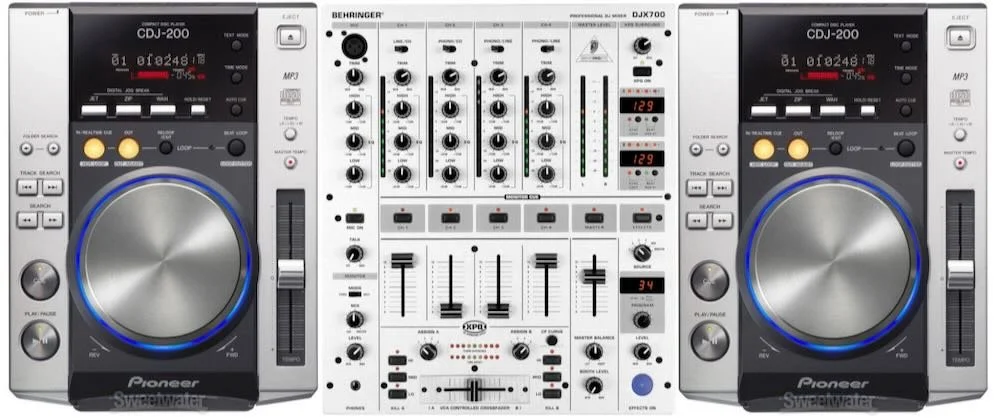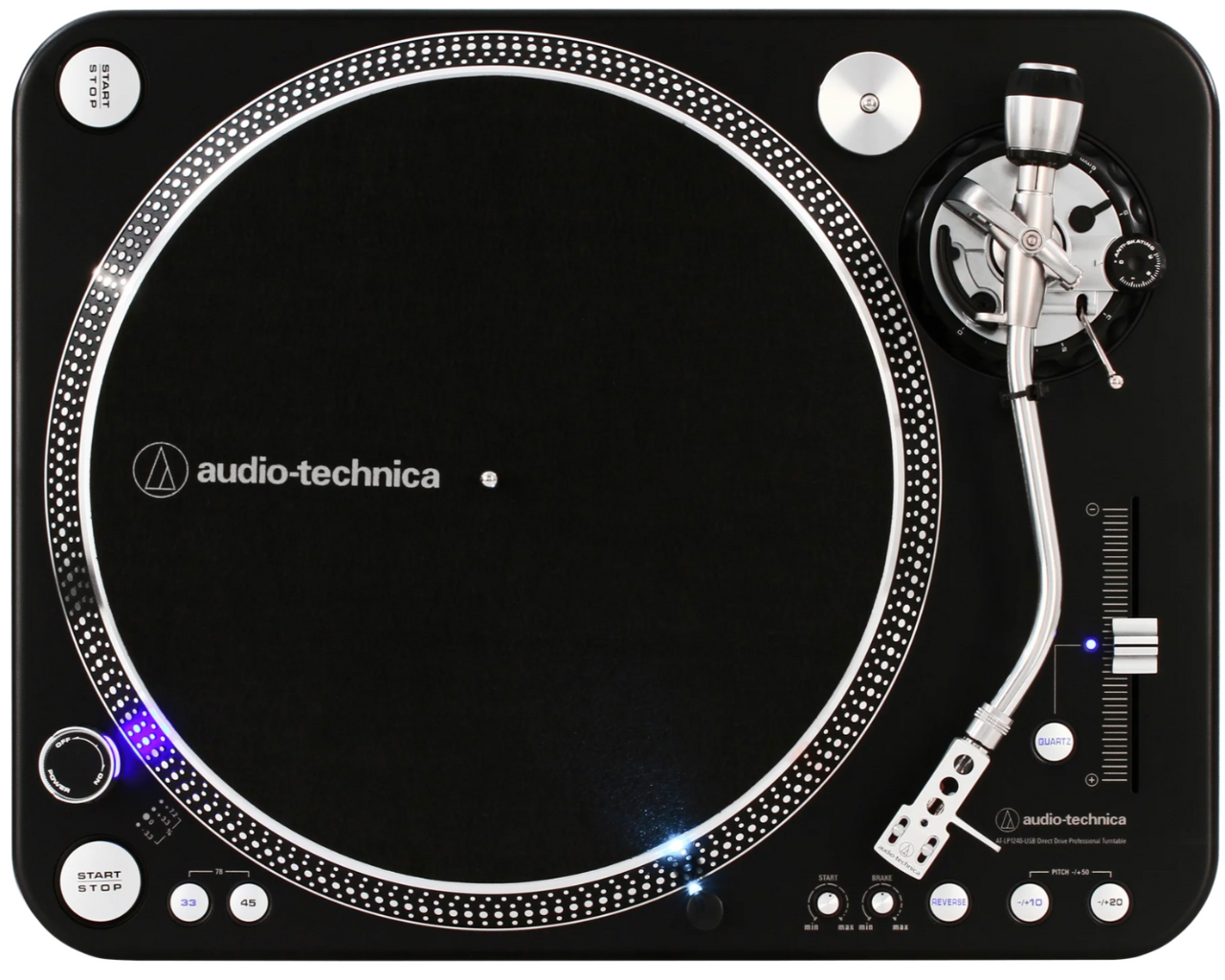Mixing Formats: What Vinyl and Digital both bring to the Booth.
Vinyl vs Digital
In the DJ world and beyond, there’s an ongoing discussion among enthusiasts and a common question asked by the curious: What’s better - vinyl or digital? In this post (the first of many on music and DJ topics), I’m going to talk about vinyl and digital DJ’ing; from a DJ and audience perspective.
I’ll say this now. "Vinyl vs digital" really isn’t the right way to think about it, and the debate of the two is often framed the wrong way. It’s not really about which one is better. It largely comes down to personal preference, context and the kind of experience you’re aiming to create.
Why I Got Into Vinyl After Starting With Digital
I bought my first pair of digital decks when I was 14. Three years later I bought my first turntable. My foray into DJ’ing with records started while I was studying audio and sound production.
My first set of decks: The ancient Pionner CDJ 200’s & Behringer DJX 700
I was intrigued by analog gear and romanticised the pre-digital era. A big part of buying my first turntable was to get a taste of the analog days that were before my time. I also knew some older DJ’s who I thought were pretty good - and they had turntables…
Once I started digging deeper into music – especially ‘70s disco, 80s post-disco ‘boogie’ and '90s house, I came across songs that weren’t available digitally and existed only on vinyl (apart from ‘rips’ on YouTube, which are low quality). Stumbling across vinyl only music pushed me deeper into the world of records and collecting. What started as a dabbling out of curiosity became a kind of necessity. If I wanted to have all the music that I loved in my collection, buying records was the only way I could do that.
My first turntable: The Audio Technica AT-LP 1240
Vinyl vs Digital DJ’ing: What’s the Difference, and Does It Matter?
In the world of digital DJ’ing there are various formats that are used. The most common is digital decks, like the pioneer CDJ series which are ubiquitous in the DJ world and have been industry standard for years. CDJ’s were introduced to somewhat mimic the vinyl format, while giving DJ’s the option to play CD’s instead of records. Over time, and many different iterations, new features were added and refined which expanded the possibilities of what DJ’s could do with their decks. Essentially, more buttons to push which DJ’s have used for better and for worse.
These days, it’s far more common to see DJ’s using digital decks, and almost all ‘mobile’ DJ’s (wedding, corporate, etc) use digital. Vinyl went from being practically the only format people would DJ with, to a niche preference. Throughout the naughties, it was largely phased out by digital gear, staying alive however in the underground dance music scene and by record lovers and purists.
Whether it’s better to DJ with vinyl or digital is completely subjective. Some DJs swear by vinyl and even claim that if you're not using records, you're not really DJ’ing. This is vinyl purism in its most cynical form.
Most vinyl DJ’s - even veterans who started with vinyl - will happily admit (or perhaps at some point, had to begrudgingly concede) that digital has it’s place. I think by this point, almost anyone who argues otherwise, are grumpy DJ’s that are stuck in the past or just like to say “I only play vinyl” as a badge of honour.
In saying that, mixing with records brings a unique and rewarding experience for those who are inclined - for both the DJ, and the audience. For a DJ, working with a physical medium is more tactile experience that can create a different kind of connection with the music.
This often translates to the other side of the DJ booth to the audience, who connect with the format in their own way. For some, it might be in more of a novelty sense as vinyl is less commonplace. For others who are more clued on and have an understanding of the skill involved and time spent finding those records, watching a DJ mix with records can add a deeper appreciation to the set.
My Love/Hate Relationship With Vinyl
If theres anything I have a love/hate relationship with, its vinyl.
I’m often asked by people if I prefer vinyl or digital. Some people are also very surprised when I tell them that I actually prefer using digital decks in a lot of instances, and if I could only use one format, it would have to be digital.
This largely comes down to the fact that digital is often more practical and accessible. I can have thousands of lossless (uncompressed) digital files on one usb. You can fit about 60 records in a record bag. There’s also lot’s of digital music that isn’t available on vinyl. Yes, there’s also lot’s of music on vinyl that you can’t get digitally, but many DJ’s ‘rip’ their records so they then have a digital copy of them.
Records are expensive. There’s plenty of poor quality pressings and buying music online can be a gamble. I’ve opened many packages to find warped records, or records that look great, but have loads of crackle and sound distorted. Even if you have great sounding records, that might not matter much if the turntables aren’t setup properly (more on this later).
You could be wondering what’s the point, and whether the headaches are worth it. Though there’s certainly been times I too have thought that, the rewarding experiences have outweighed the bad. The love side of it is getting a stack of records in the mail that aren’t warped and sound amazing. It’s flicking through my collection instead of looking at a screen. It’s the satisfaction of executing a seamless mix on format which is more hands-on and challenging than digital decks.
In an environment where you have quality turntables that have been set up correctly, while playing to an audience that appreciates and connects with the format, DJ’ing with records can be a much more rewarding experience.
When Vinyl Makes Sense – and When It Doesn’t
Mixing vinyl requires an extra level of care, detail and delicateness. Turntables need to be setup properly and the environment that your using them in matters. Also there’s some scenarios (like a wedding dance floor) where, in my opinion, it’s much more practical to use digital decks.
I reckon I’ll do a seperate post on how to set up turntables properly, but in short, it’s important the turntables are levelled and isolated from vibrations caused by speakers. The environment your in should be considered too. If it’s too windy, needles are gonna fly off your records. If it’s a scorching day, don’t let your records sit in direct sunlight for even a minute, because they will start to melt.
Vinyl often works best in ‘set and forget’ situations. For example, a nightclub where the time can be taken to ensure the turntables are setup correctly and fix any problems like feedback. Provided the sound system doesn’t change, that setup can remain how it is - week in, week out without having to worry about problems.
This doesn’t mean that you can’t use records for one-off events or temporary installations. I do this regularly and rarely have issues. This is because I take precautionary measures to eliminate problems like feedback. I always like to give myself the time to set everything up right and will check the weather forecast for outside gigs. I’ll chat to clients before a gig to explain the logistics involved and advise them on any challenges we could come up against using records. 80% of the time, I still bring digital decks for backup.
Digital Wins for Convenience, and often for Functionality
Digital decks offer functionality that isn’t possible with records. Although I don’t use a lot of the features available on digital decks, there’s some tools that I love and use regularly. For example the looping function allows me to tease intro’s of songs, and arrange tracks in different ways.
A common function used on digital decks is ‘master tempo’ or ‘key lock’ button. This makes it possible to change the speed (tempo) without the pitch (key) of a song. In the analog world, these two parameters are interlocked. Many DJ’s don’t use master tempo for audio quality reasons, but in many applications the audio difference is negligible, and the feature is very useful. For example, If you wanted to play a Barry White song a lot faster than it’s original tempo, master tempo allows you do this without making him sound like a chipmunk.
Pioneer CDJ 3000’s - Pioneers current flagship digital decks that offer a bit more functionality than the modest CDJ 200’s I started with…
Final Thoughts
It’s really not about ‘vinyl vs digital’. Both have their place and to each their own. The ease and functionality of digital is inarguable, with even diehard vinyl loving DJ’s opting for digital decks in certain situations.
DJ’ing with records has it’s limitations in terms of functionality, but for many who enjoy the format, that really doesn’t matter. The limitations of vinyl can actually inspire creative mixing in its own right and expose the technical aptitude of highly skilled DJ’s and turntablists.
My optimal preference is using…. Both! Doing a vinyl only set can be rewarding, but I find a combination of digital and vinyl offers the best of both worlds. CDJ’s let me explore digital functionality, including thousands of songs on a USB stick. Incorporating records into the mix (no pun intended) lets me enjoy the hands on, tactile experience.
At the end of the day, the goal is the same – to share good music, create a great an atmosphere and hopefully give others the same feeling and enjoyment from the music in my collection that I do. Whether that comes from a dusty disco 12-inch or a file on a USB stick, the format you use doesn’t matter nearly as much as how you use it.





